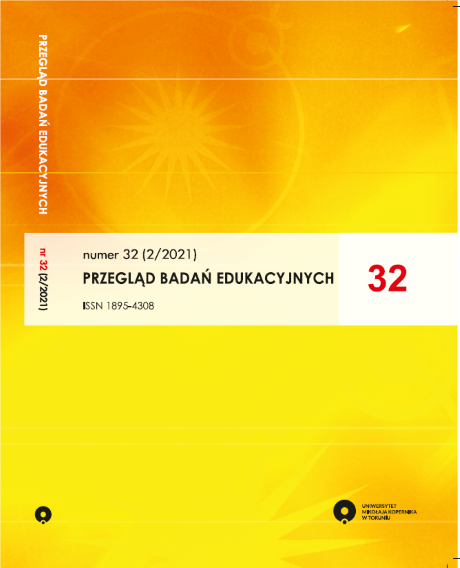There Is No End of Paradigms War in Social Sciences: A Meta-Analytical Approach
DOI:
https://doi.org/10.12775/PBE.2021.011Keywords
paradigms, positivism, constructivism, pragmatism, power, epistemic communities, academic freedomAbstract
The article is devoted to analyzing the present relevance of paradigms war concept, the most abstract meta-problem in social science. The main problem can be expressed in the following way: is it possible that there is the end of phenomenon called a paradigms war in the situation of common acceptance of pluralist approach to making science and growing importance of “mixed methods research”? To answer this question, the Author confronts the positivist and constructivist paradigms. These are compared with the special emphasis put on the epistemological differences between them and also differences between the nature of their research, quantitative or qualitative. The next analysed context is related to an alternative approach, pragmatism which rejects “the either-or position” and stresses the importance of mixed methods research is examined. To answer the main question, the Author further moves on to study these paradigms as an instrument of power in academia, especially when relating to promoting the younger generation of scholars. Against this background, the concept of epistemic communities, which is based on the idea of intersubjectivity and reciprocity of perspectives, is taken into account. Finally, the author concludes that the idea of academic freedom as a base of paradigmatic pluralism needs to be stressed. The meta-analytical approach to the main problem has been used by the author.
References
Barbalet, J. (2002). Science and Emotions. Sociological Review, (50)2, 75-96, doi: 10.1111/j.1467 954X.2002.tb03595.x.
Bloodgood, E. (2008). Epistemic Communities, Norms, and Knowledge, San Francisco: Paper prepared for presentation at the International Studies Association Annual Conference. Retrieved 27 October 2020 from http://citeseerx.ist.psu.edu/viewdoc/download?doi=
1.1.701.9474&rep=rep1&type=pdf.
Boukezzoula, M. (2019). A Plea for a Focus on the Contrasts Between Two Paradigms and Their Implications for Problem Statement. Arab World English Journal, (10)3, 448–469, do: 10.24093/awej/vol10no3.32.
Bonaccorsi, A. (2018). Towards an Epistemic Approach to Evaluation in SSH. In: A. Bonaccorsi (Ed.), The Evaluation of Research in Social Sciences and Humanities. Lessons from the Italian Experience (pp. 1 -29). Cham: Springer, doi: 10.1007/978-3-319-68554-0_1.
Bourdieu, P. (1975). The Specificity of the Scientific Field and the Social Conditions of the Progress of Reason. Social Science Information, (14)6, 19-47, doi: 10.1177/053901847501400602.
Bryman, A. (2008). The End of Paradigms War? In: P. Alasuutari, L. Bickman, & J. Brannen (Eds.), The Sage Handbook of Social Research Methods (pp. 13-25). Los Angeles: Sage Publications, do: 10.4135/9781446212165.n2.
Collins, R. (1968). Competition and Social Control in Science: An Essay in Theory Construction. Sociology of Education, (41)2, 123–140, doi: 10.2307/2111847.
Ghosh, R. (2020). Mixed Methods Research: What are the Key Issues to Consider? In: M. Khosrow-Pour (Ed.), Cognitive Analytics: Concepts, Methodologies, Tools, and Applications (pp. 32-41). Hershey: IGI Global, doi: 10.4018/978-1-7998-2460-2.ch079.
Grinnell, F. (2009). Everyday Practice of Science: Where Intuition and Passion Meet Objectivity. Oxford: Oxford University Press, doi: 10.1093/acprof:oso/9780195064575.001.0001.
Haas, P.M. (2015). Epistemic Communities, Constructivism and International Environmental Politics. London: Routledge, doi: 10.4324/9781315717906.
Hall, R. (2008). Applied Social Research: Planning, Designing and Conducting Real-World Research. South Yarra: Palgrave MacMillan.
Holloway, I. (2005). Qualitative Writing. In: I. Holloway (Ed.), Qualitative Research in Health Care (pp. 270-286). Maidenhead: Open University Press.
Hudson, J., & Lowe, S. (2009). Understanding the Policy Process: Analysing Welfare Policy. Bristol: The Policy Press.
Johnson, B. & Christensen, L. (2012). Educational Research: Quantitative, Qualitative, and Mixed Approaches. Los Angeles: Sage.
Krauss, S. E. (2005). Research Paradigms and Meaning Making: A Primer. The Qualitative Report, (10)4, 758-770, doi: 10.46743/2160-3715/2005.1831.
Kukla, A. (2000). Social Constructivism and the Philosophy of Science. London: Routledge, doi: 10.4324/9780203130995.
Laor, L. (2016). Paradigm War: Lessons Learned from 19th Century Piano Pedagogy. Newcastle: Cambridge Scholars Publishing.
Maree, D. J. F. (2020). Realism and Psychological Science. Cham: Springer, doi: 10.1007/978-3-030-45143-1.
Melosik, Z. (2019). Pasja i tożsamość naukowca. O władzy i wolności umysłu [Passion and Scientist Identity. On Power and Freedom of Mind]. Poznań: Wydawnictwo Naukowe UAM.
Melosik, Z. (2009). Uniwersytet i społeczeństwo. Dyskursy wolności, wiedzy i władzy [University and Society. Discourses of Freedom, Knowledge and Power]. Kraków: Impuls.
Melosik, Z. (1996). Tożsamość, ciało i władza. Teksty kulturowe jako (kon)teksty pedagogiczne [Identity, Body and Power. Cultural Texts as Pedagogical (Con)Texts]. Poznań-Toruń: Wydawnictwo Edytor.
Morgan, D.L. (2014). Integrating Qualitative and Quantitative Methods: A Pragmatic Approach. Los Angeles: Sage.
Mukherjee, A., & Kamarulzaman, N. H. (2016). Mixed Method Research: A Concept. In: M.L. Baran, & J.E. Jones (Eds.), Mixed Methods Research for Improved Scientific Study (pp. 39-65). Hershey: IGI Global.
Romani, L., Primecz, H., & Topçu, K. (2011). Paradigm Interplay for Theory Development: A Methodological Example With the Kulturstandard Method. Organizational Research Methods, 14 (3), 432-455, doi: 10.1177/1094428109358270.
Schwandt, T.A. (1994). Constructivist, Interpretivist Approaches to Human Inquiry. In: N.K. Denzin, & Y.S. Lincoln, Handbook of Qualitative Research (pp. 118-137). Thousand Oaks: Sage Publications.
Sousa, F.J. (2010). Metatheories in Research: Positivism, Postmodernism, and Critical Realism. In: A.G. Woodside (Ed.), Organizational Culture, Business-to-Business Relationships, and Interfirm Networks (pp. 455-503). Bingley: Emerald Group Publishing Limited, doi: 10.1108/S1069-0964(2010)0000016012.
Stanley, M., & Nayar, S. (2015). Deepening Understandings. In: S. Nayar, & M. Stanley (Ed.), Qualitative Research Methodologies for Occupational Science and Therapy (pp. 8-20). Abingdon: Routledge.
Symonds, J. E., & Gorard, S. (2008). The Death of Mixed Methods: Research Labels and their Casualties, Heriot Watt University, Edinburgh: The British Educational Research Association Annual Conference. Retrieved 10 October 2020 from https://www.researchgate.net/publication/252477890_The_Death_of_Mixed_Methods_Research_Labels_and_their_Casualties.
Tashakkori, A., & Teddlie, C. (1998). Mixed Methodology: Combining Qualitative and Quantitative Approaches. Thousand Oaks: Sage Publications.
Downloads
Published
How to Cite
Issue
Section
Stats
Number of views and downloads: 822
Number of citations: 0



